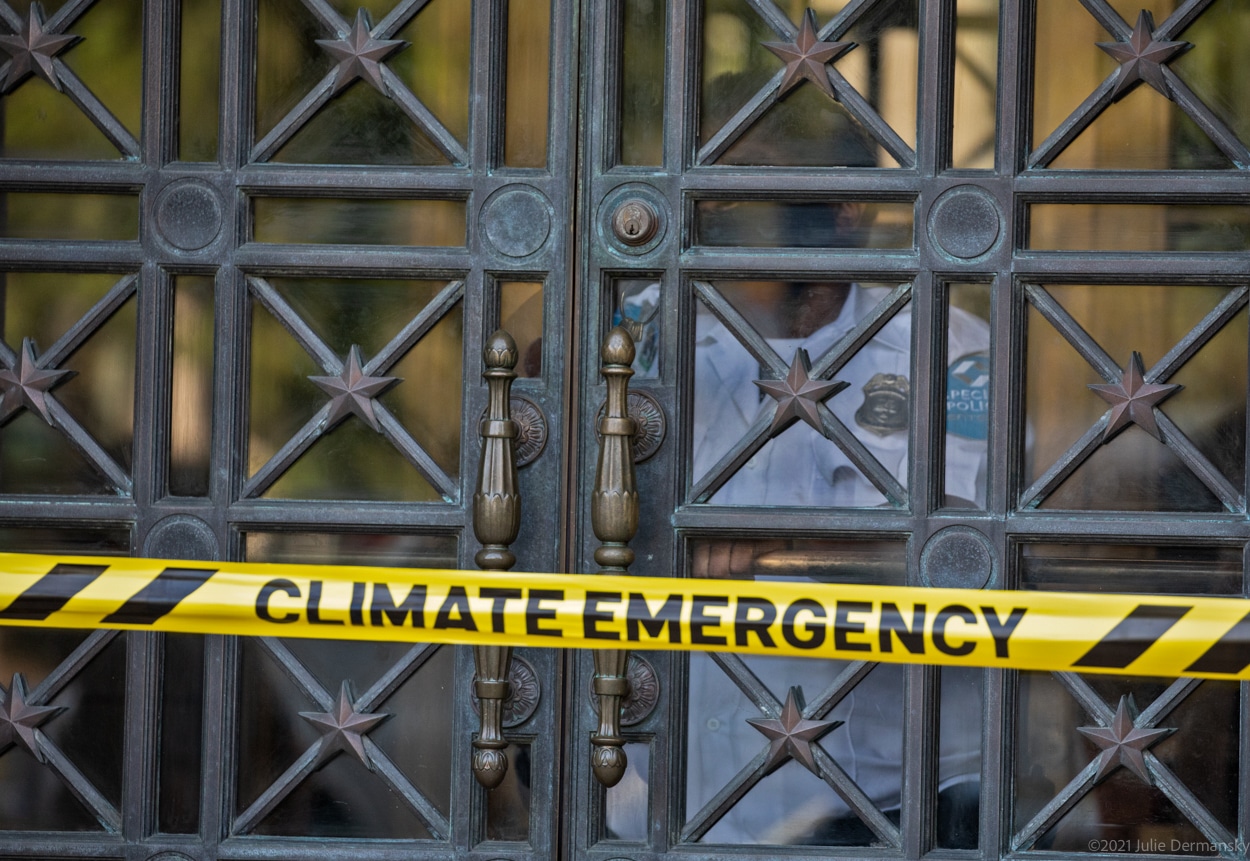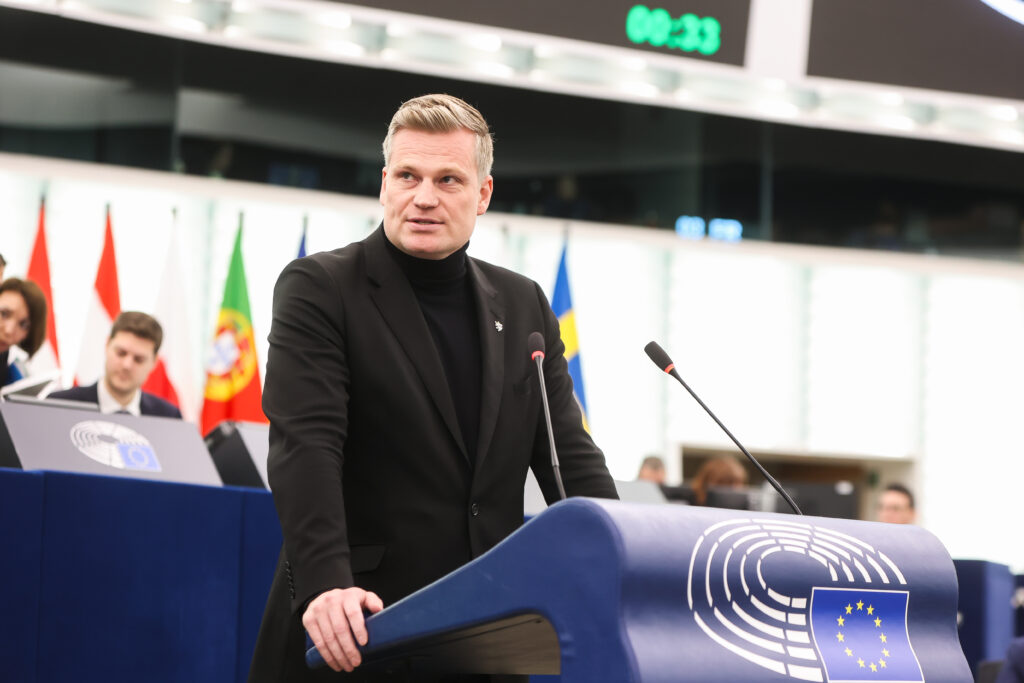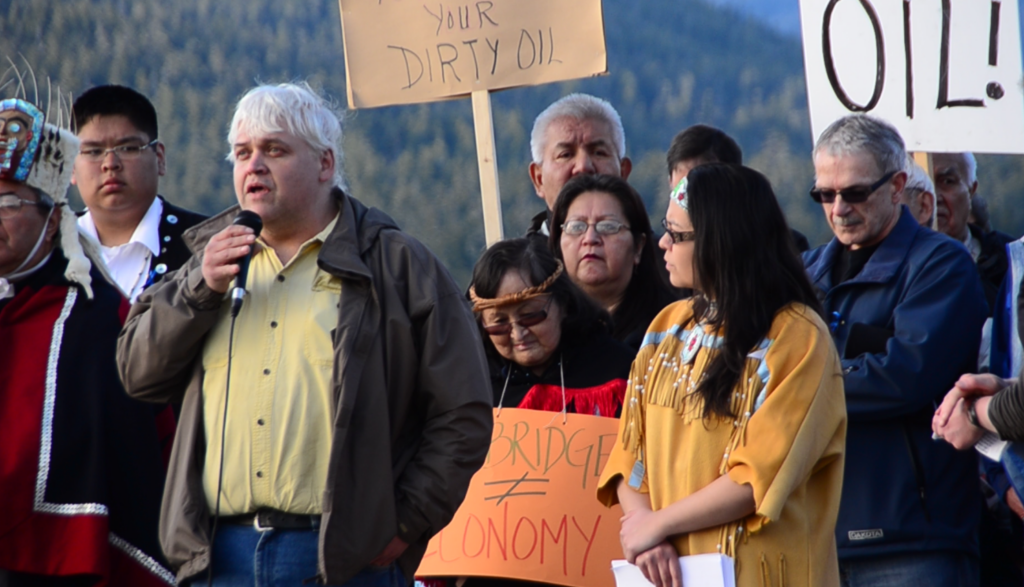This week, environmental advocates addressed intensifying fossil fuel pollution, climate injustices, and the Biden administration’s failure to take the lead on climate change solutions during the People vs. Fossil Fuels protests in Washington, D.C. Their goal remains to increase the pressure on the President to declare a climate emergency. The Indigenous-led actions are supported by dozens of environmental and social justice groups from around the country and have resulted in 585 arrests so far. They began on Indigenous People’s Day, October 11, and will continue through October 15.
Thursday morning, October 14, 130 people were arrested in front of the White House. For four days, activists have marched each morning from Freedom Plaza to the White House. Some protest on the sidewalk in front of the fence and are arrested after defying orders to disperse, while others cheer them on from across the street. They say they are doing this to bring their message to Biden’s doorstop ahead of the COP26 climate summit in Glasgow, Scotland next month.
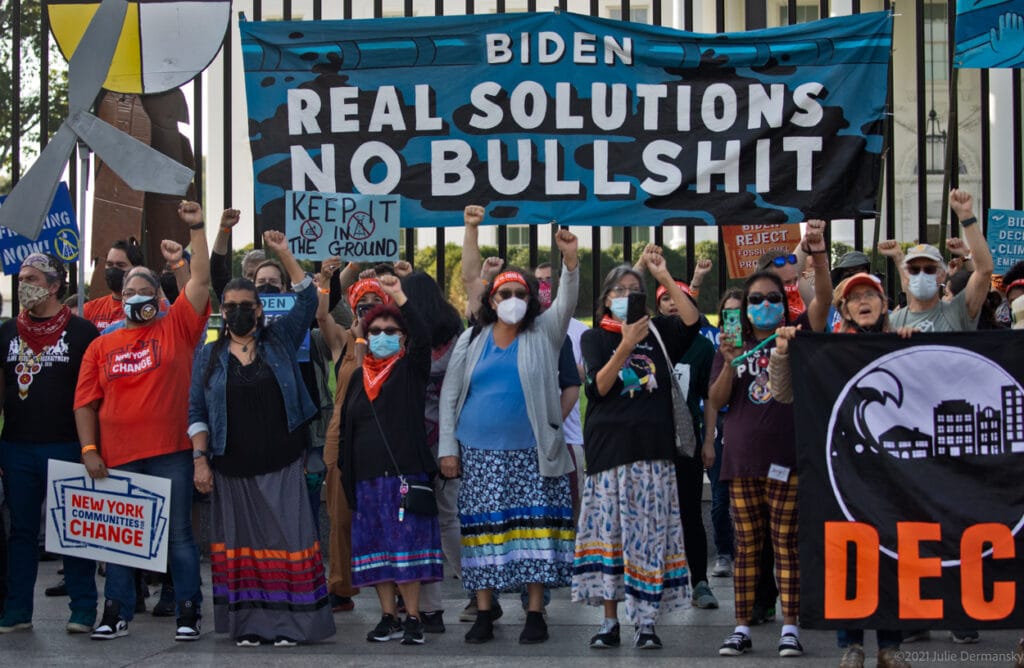
The focus of the day’s protests was climate change solutions. Environmental advocates pressing for a faster transition to renewable energy were among those arrested on Thursday. That included a few scientists, such as Sandra Steingraber, a biologist and author famous for bringing to light the health impacts of living near fracking industry sites.
“U.S scientists are done speaking calmly in the face of inaction,” Steingraber said in front of the White House on Thursday, before making a plea for President Biden “to act on the science.”
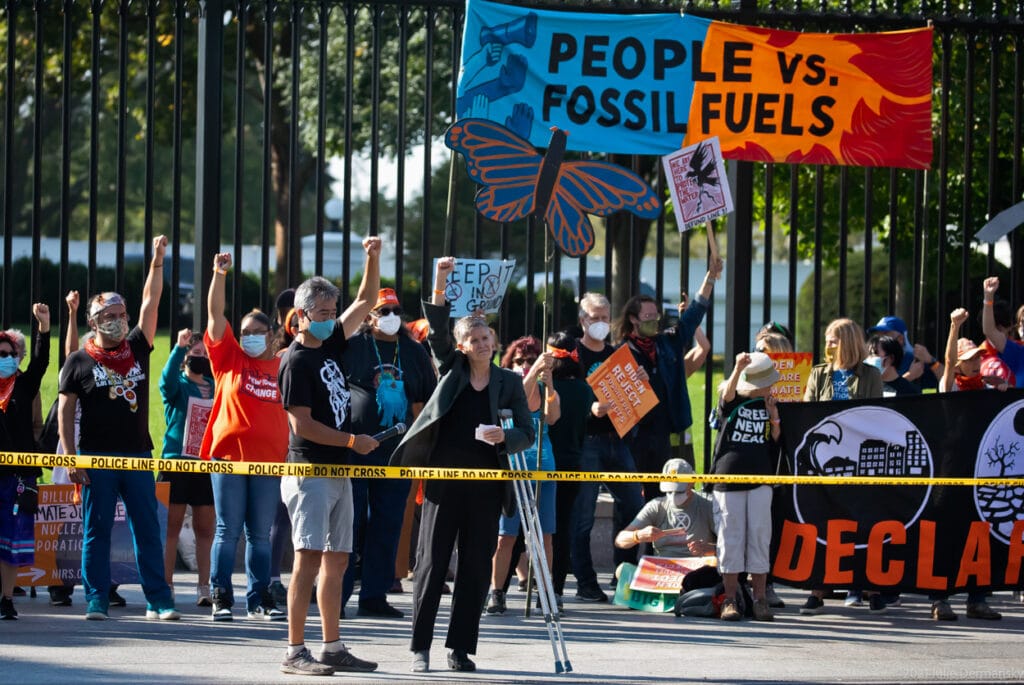
In the afternoon at another protest, two dozen Indigenous climate activists and their allies locked themselves inside the Department of Interior building, home to the Bureau of Indian Affairs (BIA), in echoes of the first Indigenous occupation of a BIA building in Colorado in 1970, which was spurred by discriminatory hiring practices and misuse of federal funds. Today’s activists blocked the building’s exits and strung custom-made police tape, replacing the words “Police line do not cross” with “Climate Emergency.”
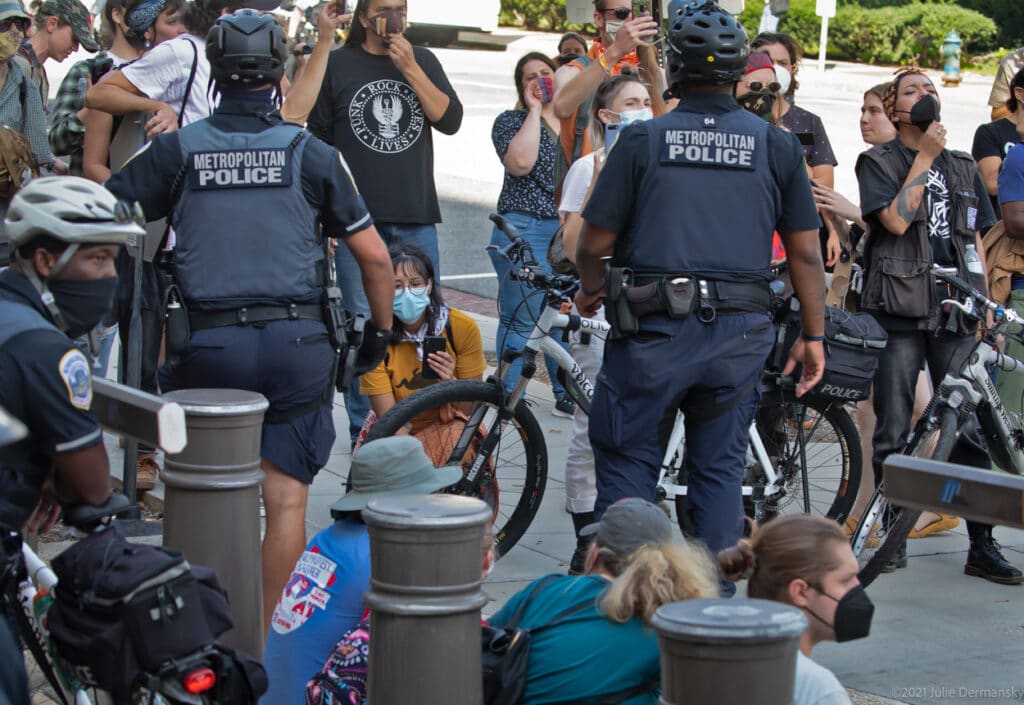
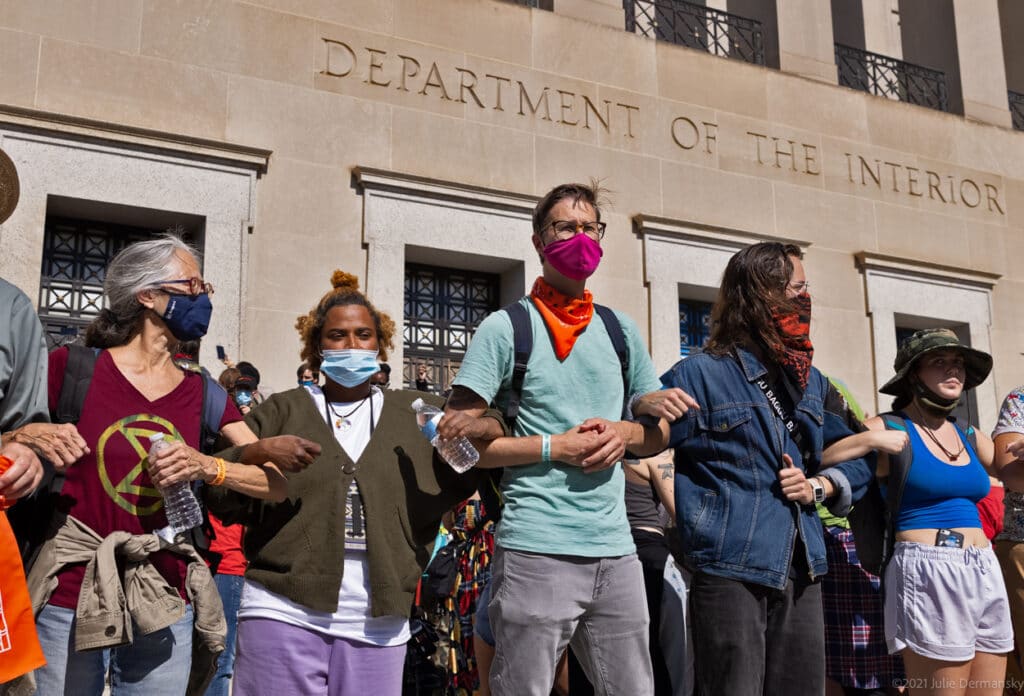
Roughly a hundred more activists gathered outside the BIA. The roughly four-hour-long occupation prompted a large law enforcement response from numerous agencies, including the Department of Homeland Security. Law enforcement arrested 55 Indigenous leaders. Police in riot gear on bikes lined one of the exits to an underground garage in the building, where vans departed with some of those who were arrested inside. Activists in one of the vans pounded on its side as it drove away.
Some of the officers used tasers and batons on multiple people who tried to enter the Interior building to join the original group of activists who were occupying it inside.
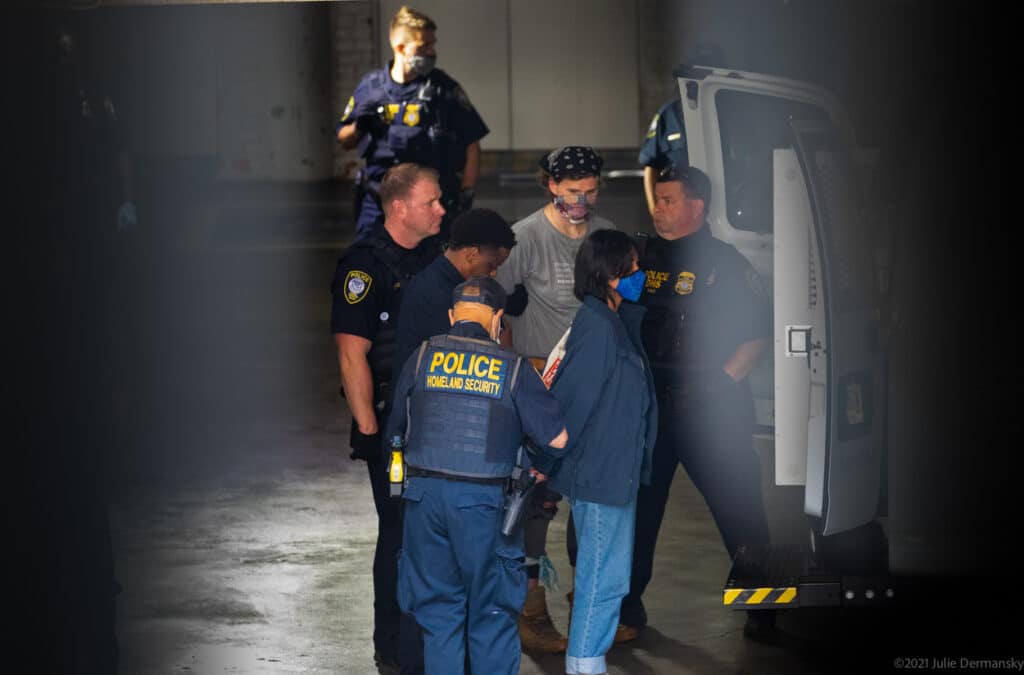
I walked to the top of the stairs where security guards and officers blocked the entrance to the building. There, I stood next to Rema Loeb, a great-grandmother who is part of the Lakota Tribe. Despite needing a walker, Loeb managed to get to the front of a group of people trying to get into the building. She pleaded with the guards to let her in.
I stepped aside before other activists pushed through the line of security guards and officers. Loeb managed to get inside and was helped out of the way by those violently pushing their way in. But instead of exiting as directed, she and about 20 others managed to slip inside with the original group already occupying the building.
After about three hours, Loeb and some of the others left on their own volition using various exits from the building. An officer escorted her out, along with another activist. I asked Loeb how she first managed to get by the guards. She told me that she “slithered in” after the guards moved her aside. She says that for her, the act of civil disobedience was worth the risk of bodily harm and arrest. “The time is growing short that we have to change our ways,” she told me. “The most important thing is the children and all life on Earth and we don’t have the right to destroy the planet for them.”
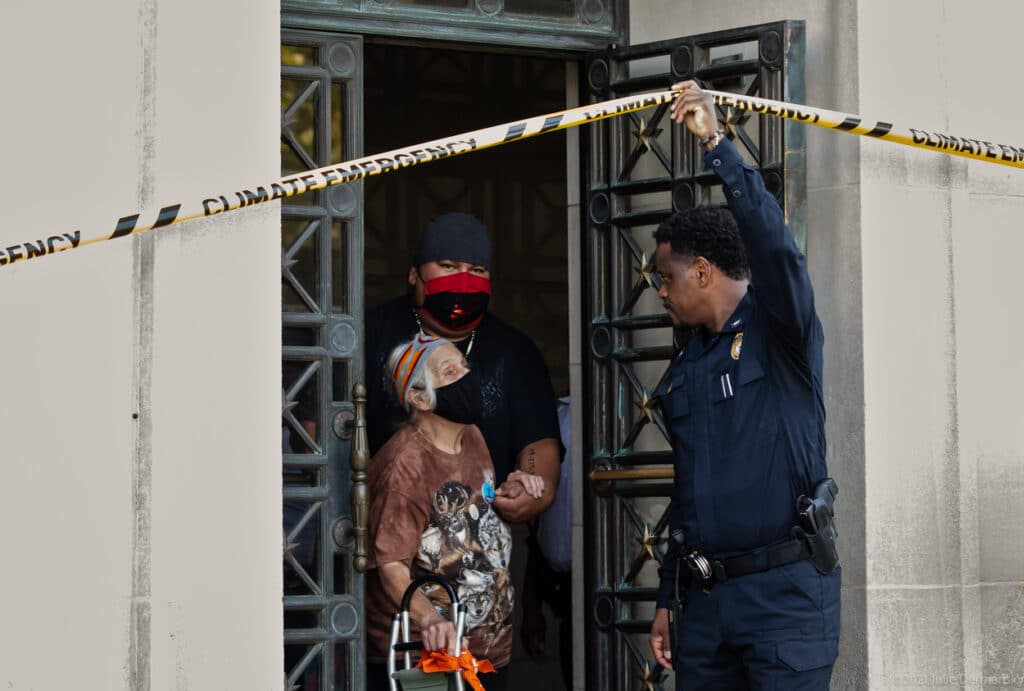
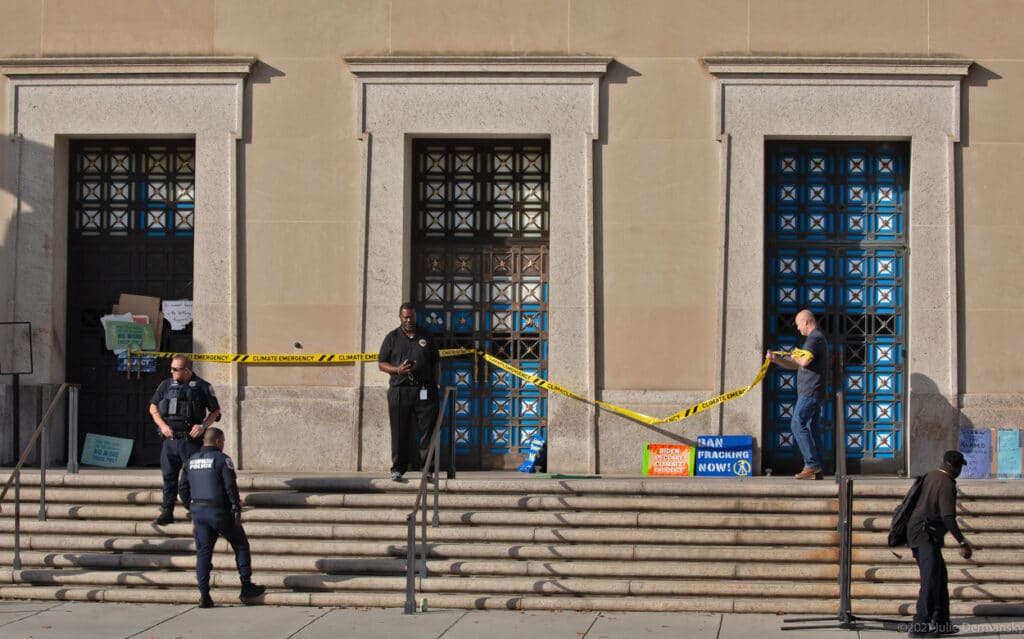
Indigenous leaders who took part in the occupation released a statement saying President Biden was continuing the federal government’s long tradition of broken promises for tribal sovereignty and making a number of demands calling for Indigenous and environmental justice. “Presidents will break their promises but Mother Earth has always given us what we need to thrive. We will not back down until our natural balance is restored,” the statement said.
‘Climate Chaos Is Happening Now’
These rallies and acts of civil disobedience are part of the five-day-long People vs. Fossil Fuel protests in the nation’s Capital this week, with hundreds each day calling on Biden to stop new fossil fuel projects.
On Wednesday, October 13, environmental justice activists from Texas and Louisiana told President Biden that “climate chaos is happening now.” Beset by worsening floods, hurricanes, and fossil fuel industry pollution, these activists say they and their communities are living in climate “sacrifice zones” and that Biden is falling down on his campaign promises to improve their situations.
These activists spoke passionately of their and their communities’ experiences surviving extreme weather and living with oil and gas industry pollution. In front of the White House, they addressed the president using a megaphone and demanded that he honor his promise to be a leader on climate action.
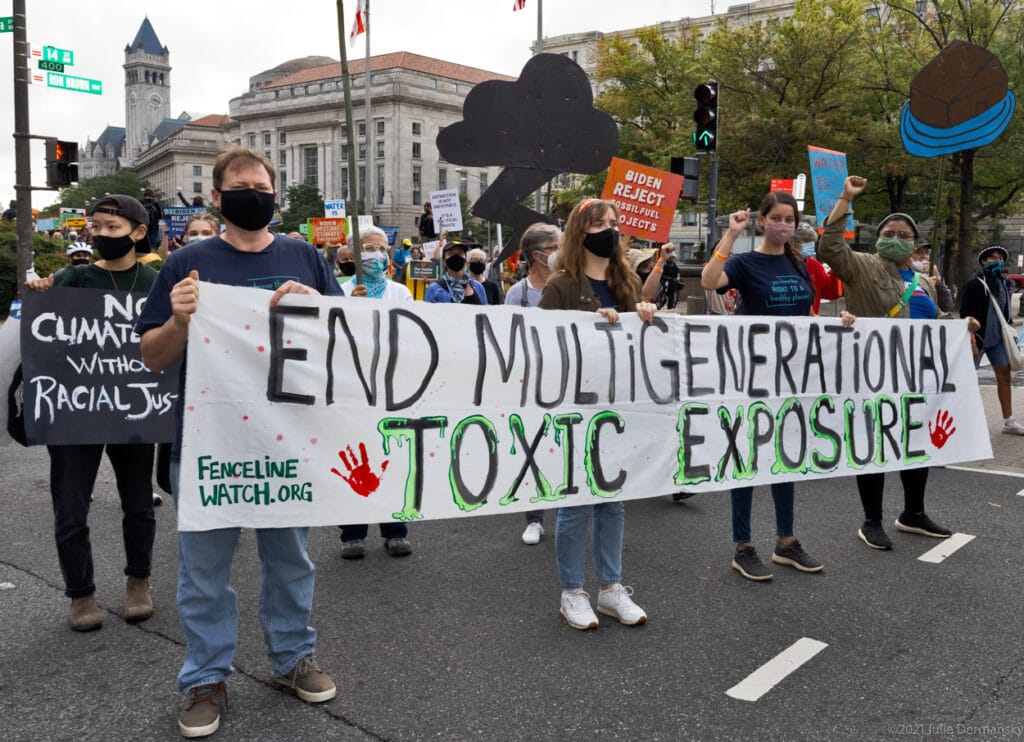
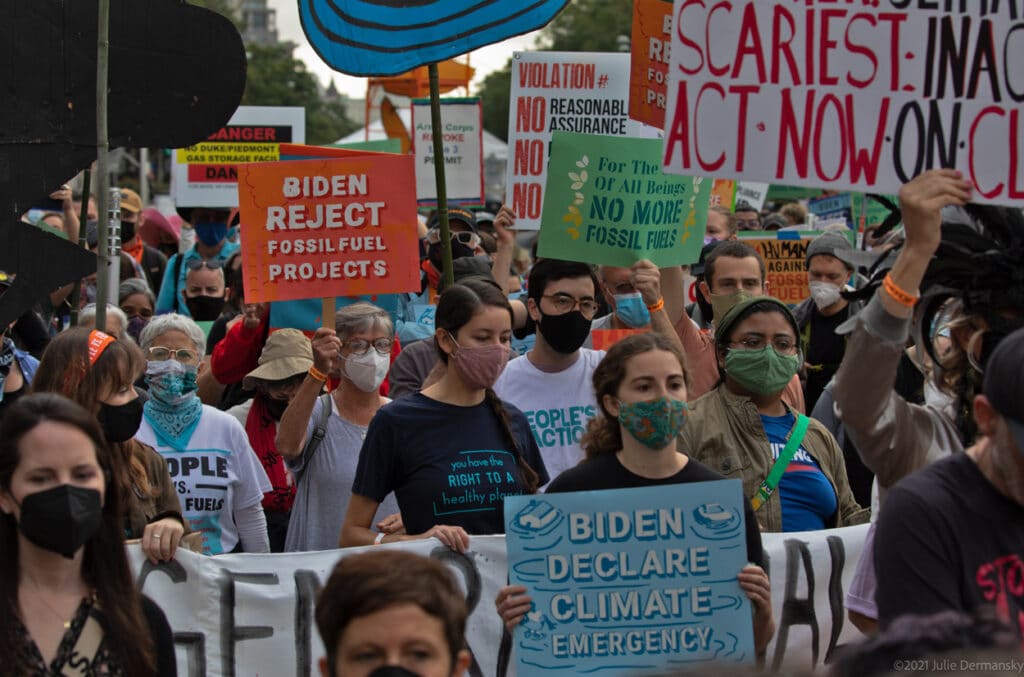
Sharon Lavigne, founder of community group RISE St. James, and Pastor Harry Joseph of the Mount Triumph Baptist Church in St. James, Louisiana, spoke of their fight against the encroaching petrochemical industry in their majority Black community, which sits in an industrial corridor along the Mississippi River known by many, including President Biden, as “Cancer Alley.” It earned that name due to the large number of petrochemical plants and refineries that emit toxic and climate-warming emissions and residents’ greatly increased risk of illness and cancer associated with those air pollutants.
Lavigne and Joseph were joined by environmental justice advocates from the Houston, Texas, area, another hotspot for oil and gas refineries and petrochemical plants. John Beard, Jr. from the Port Arthur Community Action Network and Yvette Arellano, founder of the grassroots group Fenceline Watch, shared stories of what it is like to live in fenceline communities next to fossil fuel plants that release toxic air pollutants while they also endure extreme weather events that have gotten worse due to climate change.
These speakers described their neighborhoods as “sacrifice zones” for the fossil fuel industry and ensuing climate change. That was a sentiment shared by Sue and Jim Franklin, who felt forced to give up their ranch near Pecos, Texas, in the Permian Basin after the fracking industry expanded all around them.
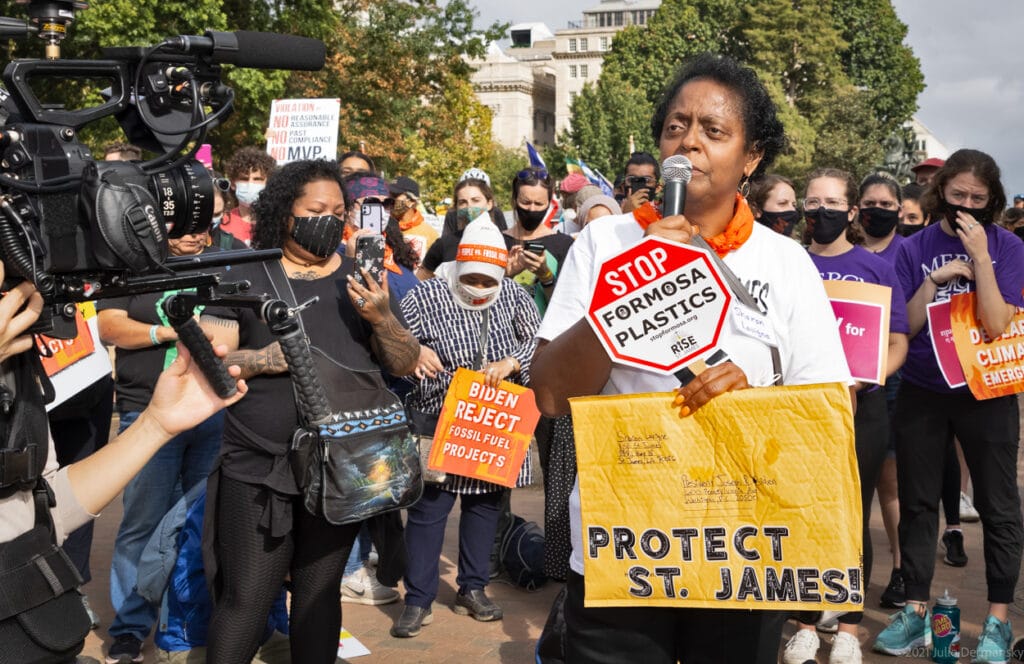
During the Wednesday rally held in Lafayette Park across from the White House, Lavigne, a 2021 Goldman Environmental Prize winner whose house was severely damaged by Hurricane Ida, turned and faced the White House, megaphone in hand. “I want to tell our President Joe Biden, you campaigned on Cancer Alley. That’s where I live. People are dying rapidly. People are dying of cancer and other ailments,” she said. “President Biden, I sent you a video to tell you about our community. I’ve asked you to come to see where we live, to come and visit us and get a whiff of all the chemicals that we’re breathing. You promised that you would do something for Death Alley. We haven’t seen anything yet. We want to hold you to what you said to us in your campaign. We voted for you and this is the way you treat us? You are letting us down by not even coming to see about us.”
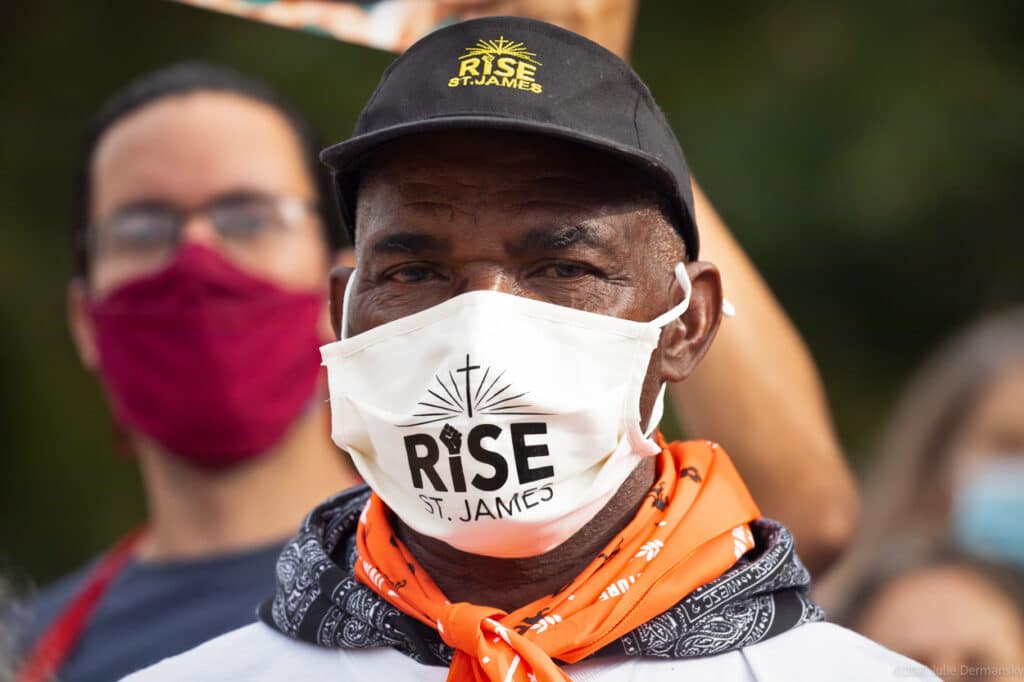
These feelings of anger and abandonment in the face of illness caused by pollution and an increased risk by extreme weather were echoed by Arellano.
“Houston, Texas, [is] home of the largest petrochemical complex in the entire nation with over 235 facilities dedicated to plastics,” Arellano told the crowd. She talked about infertility problems facing people with multi-generational exposure to chemical pollution and the clear need for racial justice along with environmental justice. Arellano also warned of the risk of reinforcing these historical injustices as the region sought to recover from extreme weather that often exacerbates pollution’s impacts on these fenceline communities.
“The toxics have trespassed the fence line, and there’s no amount of fines or money that can correct that measure,” she said. “So when we are asked to build back, we must be careful of false solutions. Money and capitalism will not solve our problem.”
“I like to say that Port Arthur is at the nexus of climate change,” John Beard, Jr. told the crowd, pointing out that the area, roughly 90 miles east of Houston, has been impacted by five major hurricanes in the last 15 years. Port Arthur, which has large Black and Hispanic communities, suffers from polluted air from the fossil fuel industry. The nation’s largest oil refinery, Motiva, is located there. According to Beard, those impacts are inescapable. He said that if you ask anyone in Port Arthur “if they know of anybody or have a relative or a family member or friend who either has had cancer, died from cancer, or is in treatment or remission from cancer, you won’t find one single person that will tell you ‘no.’”
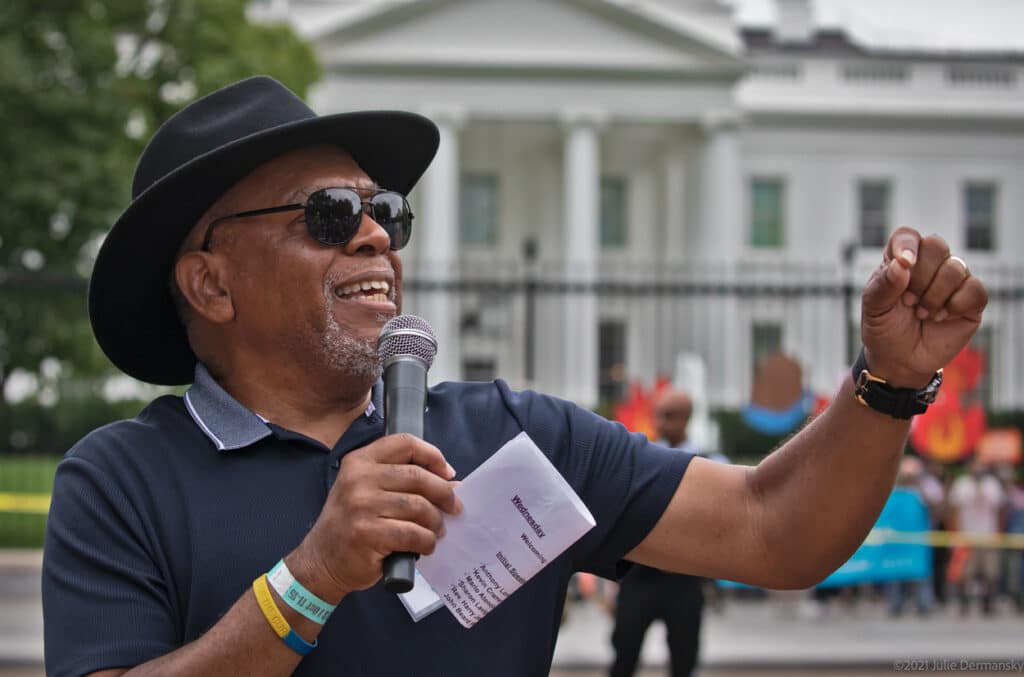
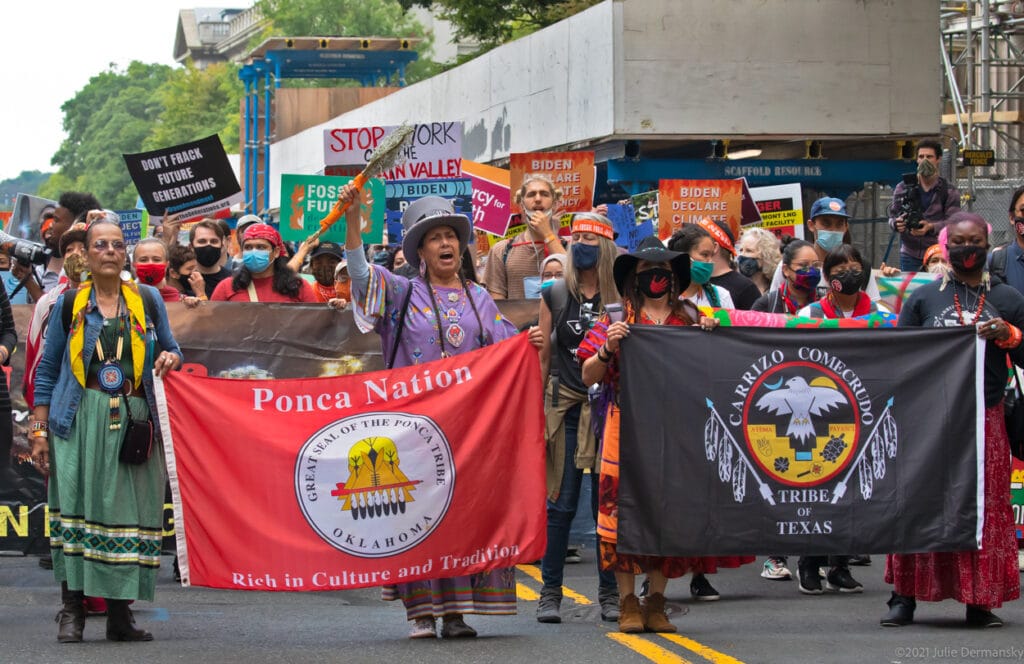
As another speaker made clear, the fossil fuel industry’s air pollution impacts aren’t limited to refineries; they start at the wellhead.
“You need to do something about the oil industry in Texas. Ordinary people living near the ever-expanding oil patch of Texas are being driven out of their homes,” Sue Franklin, speaking from personal experience, said during the rally.
“The Permian Basin where I live in West Texas is a global climate bomb that has not improved since you’ve been in office, Mr. President,” she went on. “It is one of the worst sources of methane greenhouse gases in the world. Currently the Permian Basin produces nearly 5 million barrels of oil per day. That extreme amount of production does not happen without harming residents like myself. The world is watching, President Biden. Please, please do something. The people out there are dying.”
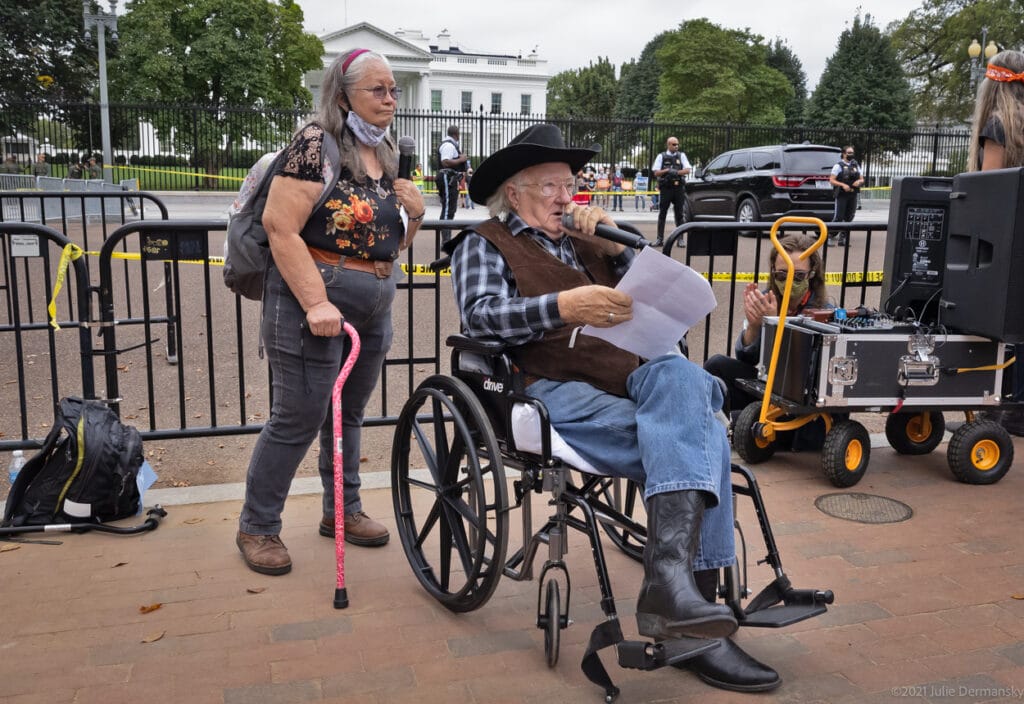
Other activists from across the country, including Mario Atencio with Diné CARE, an organization that works to protect the environment of Navajo Nation, continued on these themes.
Atencio spoke about the ways the fossil fuel industry has affected his community and called again for stronger climate action from President Biden to reverse the industry’s harms. “The lack of action to stop drilling on public lands has had serious impacts on the community health of the Navajo people who live near oil and gas wells,” Atencio said. “According to a community health impact assessment done by the local Navajo communities, the toxic chemicals released by the oil and gas wells are impacting the health of the children. This is the consequence of the inaction: the little ones are being hurt because Biden can’t fulfil something he promised. We can’t wait. Our communities are being hurt. We need the leases stopped.”
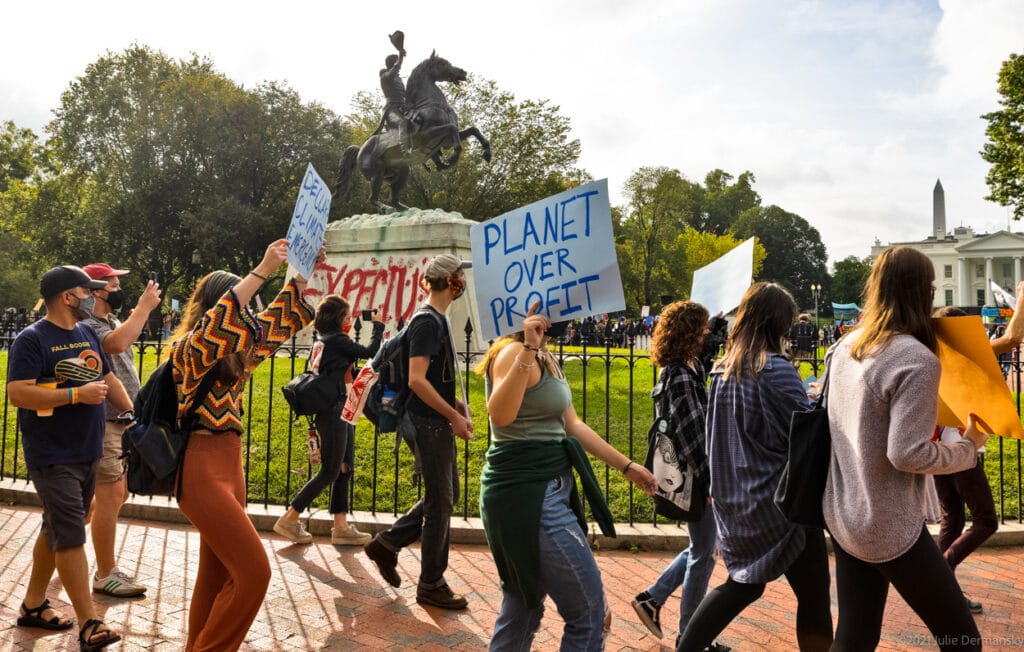
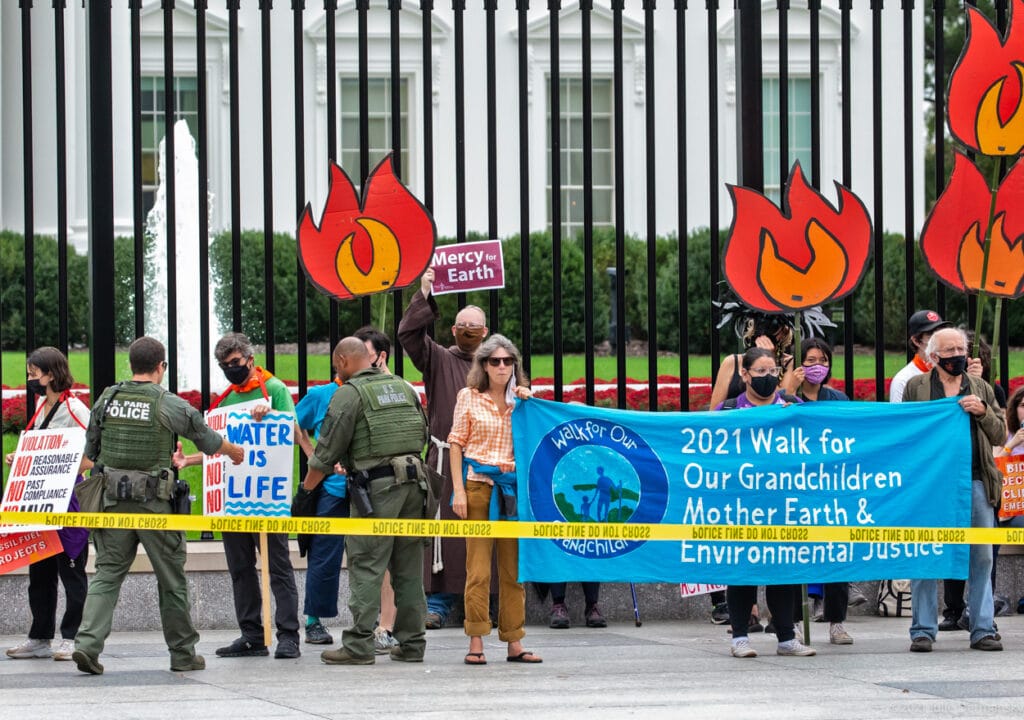
The organizers of the week of protests sent a press release underlining how fossil fuel projects have continued to build momentum under President Biden:
“Since taking office, however, the Biden Administration has approved a record number of new oil and gas leases on public lands, refused to stop major new fossil fuel projects like the Line 3 pipeline, and been slow to crack down on existing pollution. Meanwhile, new analysis from Oil Change International shows that if the Biden Administration moves ahead with 21 major fossil fuel infrastructure projects that are currently under federal review, it would be the emissions equivalent of adding 316 new coal fired power plants — more than are currently operating in the United States. The total emissions from just these projects would represent 17 percent of total U.S. greenhouse gas emissions in 2019.”
President Biden, who has called the climate crisis a “code red” emergency, has not yet acknowledged the protesters or their demands. A final day of marching and protest is planned for Friday, October 15.
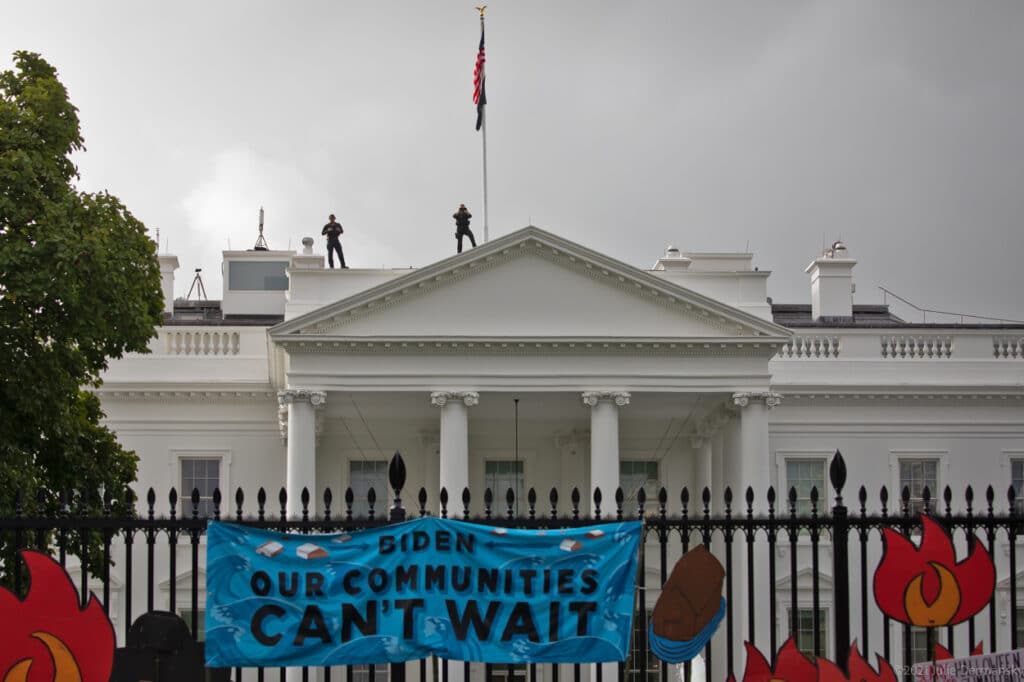
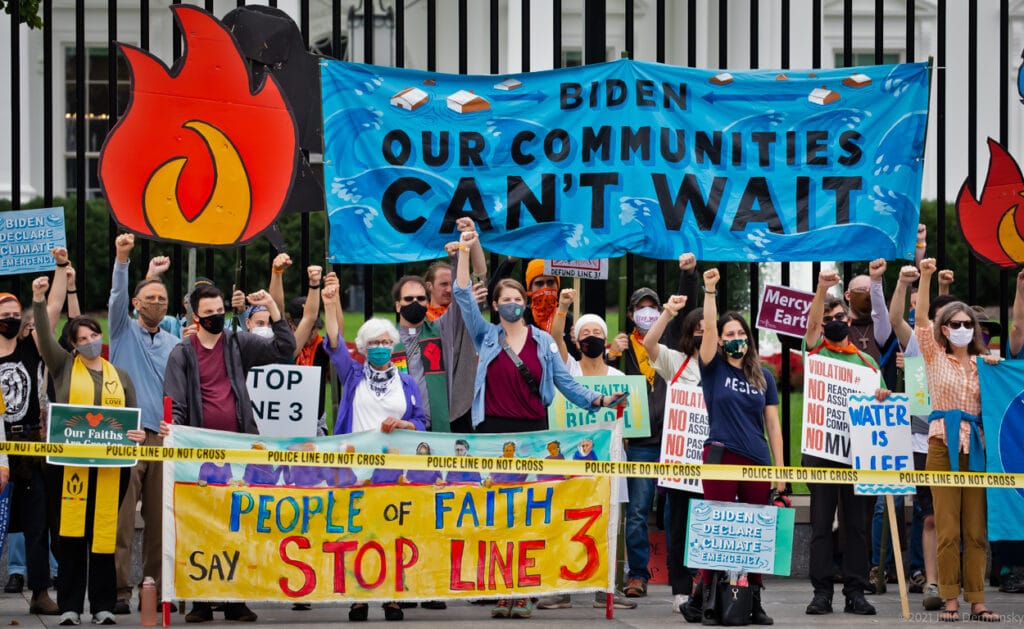
Subscribe to our newsletter
Stay up to date with DeSmog news and alerts


